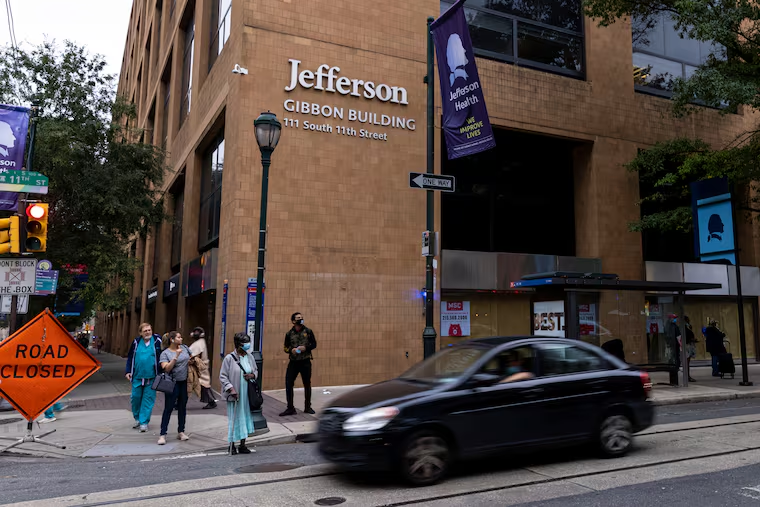Jefferson Hospital officials admit staffers should have known sooner about active shooter on campus
The hospital has promised to review security procedures and said it has already contracted more security staff.

Jefferson University Hospital officials on Thursday admitted that it took them too long to notify staffers of an active shooter situation at the hospital’s Gibbon Building Monday that resulted in the death of a certified nursing assistant. Some employees didn’t get the word for more than a half hour after Philadelphia Police first reported the shooting.
In a statement provided to The Inquirer and sent to hospital employees Thursday evening, Jefferson spokesperson John Brand said that “process deficiencies and human error” contributed to delays in communications. In particular, he said, the hospital’s loudspeaker system, which is supposed to be used to alert staffers to emergencies in their building, “was not used effectively.”
The hospital did not make top officials available for interviews and did not explain how “human error” contributed to the communication delays.
Just after midnight Monday, police say Stacey Hayes, a Jefferson certified nursing assistant, fatally shot fellow CNA Anrae James in a ninth floor hallway of the Gibbon Building, part of the hospital’s Center City campus. Both men had worked there for years on the night shift.
The shooting stunned colleagues who had known and liked both men, and rattled a hospital workforce already under pressure from 19 months of the COVID-19 pandemic. Adding to their anxiety were questions about Jefferson’s safety practices and policies, and how staffers were warned of the shooting.
In the Thursday statement, Brand said that because the overhead communication system wasn’t used properly, staffers learned of the shooting through text alerts and social media. For some staffers, the text alerts themselves were delayed. Some employees have said they weren’t notified there was a gunman on the Center City campus until about half an hour after the shooting.
The shooting was first reported over police scanners around 12:12 a.m., and security reported to police that the gunman was believed to have left the building at about 12:22. Some staffers reported not getting a text alert from Jefferson until 12:44. Some who heard only that there was a shooting and didn’t know if the gunman was still in the hospital said they hid in terror, emerging only to check on patients.
In addition, Brand said, hospital officials called a “code blue” alert before they told staff about an active shooter on campus. The alert brought a trauma response team to the ninth floor, where James was shot.
The gunman had already left the campus by the time the code blue was issued: in other words, the trauma response team was not called into an active shooting scene. But the order in which the code blue and the active shooter alerts were issued was “a protocol error,” Brand wrote.
Brand said that hospital officials do not believe James’ death would have been prevented even if emergency communications had been sent to staff in a timely fashion. A widely circulated surveillance video shows James seated at a computer work station when a gunman came up and shot him, then pursued him as he tried to run.
Though they have not announced a motive, police have said that the shooting was targeted. Jefferson employees who witnessed the shooting have said the gunman seemed fixated on James. As an employee, Hayes allegedly used his security badge to get onto the floor. Hospital security systems such as turnstiles at visitor entrances and metal detectors in the emergency room, are meant to protect patients and staff from outside intruders.
The hospital has promised to review security procedures and said it has already brought on more security staff. Brand wrote in the statement that the hospital will also have more Philadelphia police on campus, and has begun “enhanced screening protocols” for everyone entering the hospital, including employees.
In addition, the hospital has closed every ground-level entrance without a staffer to monitor it, and has reduced entrances at its main hospital building after daytime business hours, as well as the 10th Street entrance to the Gibbon building.
Officials have also promised improvements to the loudspeaker emergency communication system and the hospital’s JeffAlert texting system.